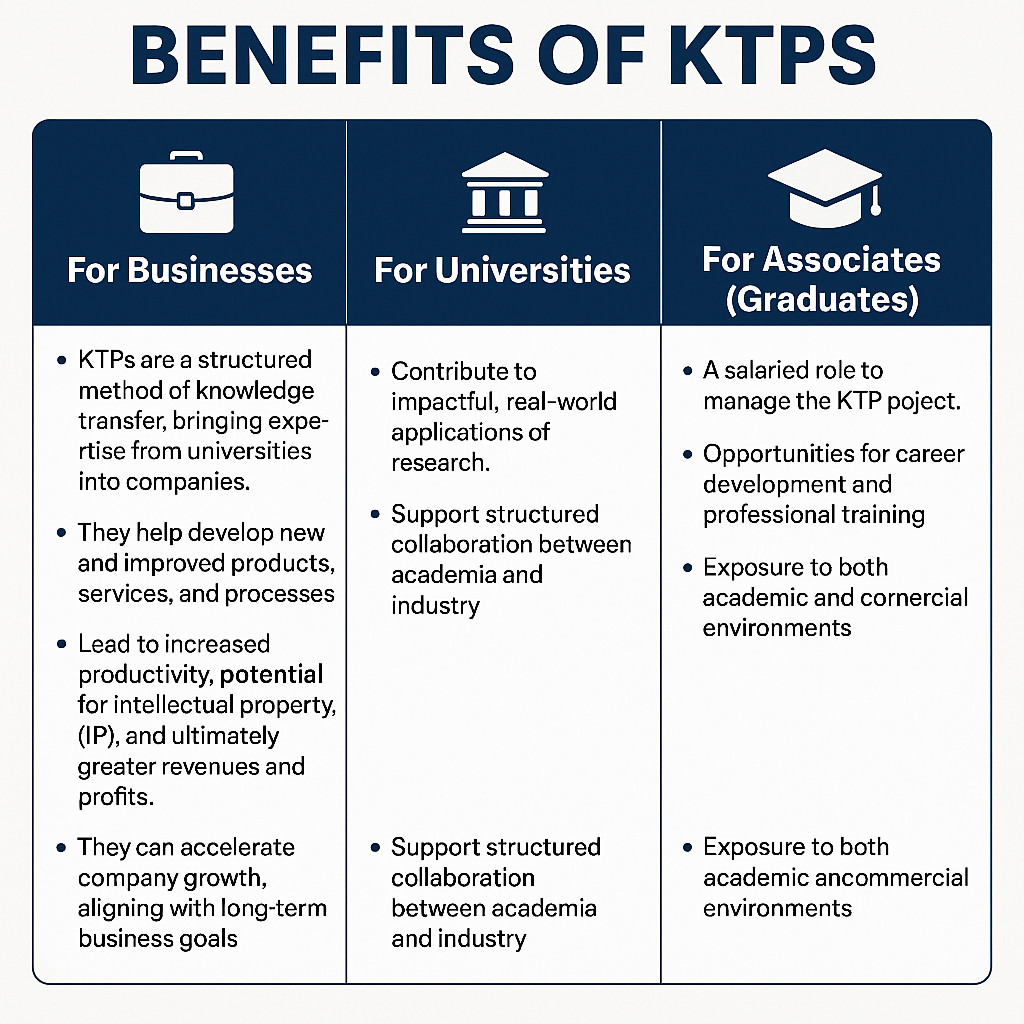On 24th June, the Innovation Exchange group met for a session exploring the value of Knowledge Transfer Partnerships (KTPs). Designed to drive innovation and embed academic expertise into industry, KTPs offer structured support and deliver impactful results. Especially valuable in the construction sector, KTPs enable projects that might not otherwise happen.
This session outlined the application process, support available, and key benefits for businesses and graduates alike, with input from Fran Keogh and Derek Thomson, Loughborough University, and Steve Baker, YORhub.
What is a KTP?
A Knowledge Transfer Partnership is a collaborative partnership among a business, an academic institution, and a graduate associate. Funded and supported by Innovate UK, these projects aim to embed academic knowledge into business to generate commercial and innovative outcomes. KTPs are not simply alternative funding mechanisms—they must facilitate projects that would not happen without the KTP structure.
How Does this Support the Construction Industry?
KTPs are valuable in construction for leveraging academic expertise, especially in areas such as digital platforms, process improvement, and public sector innovation. They provide access to cutting-edge research and support that businesses might not otherwise have access to.

Key Information About KTPs
Application Process
- Connect and Create: Initial engagement with the university or an academic.
- Develop: Fill out a ‘fact find form’ to define the project idea and engage with the Innovate UK advisor.
- Apply: Complete and submit the application documents, i.e. information about the workplan and commercial impacts.
Timeline: The complete journey from start to launch takes approximately 10–12 months.
Support Offered
Both Innovate UK and the participating university provide significant support:
- A Knowledge Transfer Advisor (KTA) to guide the project.
- Help with application writing.
- KT office admin services, including:
- Recruitment support for the associate.
- Purchasing and budgeting support for project spending.
- Management of quarterly payments.
- Coordination of project meetings.
- Ensuring smooth delivery and ongoing collaboration.
Funding & Costs
- Funding comes from Innovate UK, with varying levels of support depending on the type of business (e.g., SMEs receive higher funding proportions).
- Project costs and typical breakdowns weren’t detailed numerically in the document but usually include salaries, equipment, and travel.
Case Studies
The group were fortunate to be joined by Steve Baker, YORhub, and Derek Thomson, Loughborough University, who spoke about the projects they have undertaken as part of a KTP.
YORhub & Leeds Beckett University
This ongoing KTP focuses on the Supply Chain Engagement Programme within YORhub. The project aims to improve how supply chains—especially local SMEs—engage with and access opportunities across public construction projects. Activities include stakeholder consultation, gap analysis, and exploring enhancements to YORhub’s digital platform to better support subcontractors and streamline supply chain processes. The goal is to increase inclusivity, efficiency, and collaboration across the supply chain while embedding academic expertise into practical solutions.
Loughborough University & Skanska
This KTP involved developing advanced digital tools and data analytics to help Skanska enter and compete in new market sectors. Key innovations included a classification tool to analyse client values and AI-driven alignment checks between client requirements and Skanska’s tender proposals. The project also produced dashboards to assess project risk and budget performance. The partnership helped Skanska enhance its understanding of client motivations, improve bid success rates, and expand digital capabilities leading to ongoing investment in apprenticeships and digital teams. The project emphasized the importance of a strong business case, good communication, and senior-level support to maximize impact and sustainability.
Key Learnings for Anyone Considering a KTP
- KTPs are highly structured and well-supported, with a lengthy application process backed by strong guidance to maximize success.
- Clear alignment of goals between the business, academic partner, and associate is essential.
- A strong, commercially relevant business case drives tangible outcomes like innovation, IP creation, and growth.
- Effective stakeholder engagement and senior-level support help embed the project and secure resources.
- Choosing the right associate with both technical skills and strong communication is crucial.
- KTPs provide valuable professional development and cross-sector experience for graduates.
- Flexibility and adaptability during the project increase its impact.
- Sustaining benefits requires focusing on long-term collaboration and culture, beyond individual tools.
Overall, investing time in upfront planning, building strong partnerships, and leveraging the robust support available makes KTPs a strategically valuable route to innovation and growth.
Get Involved
This session was held as part of the Constructing Excellence Innovation Exchange group. To join us for the next session, sign up via our events page.



